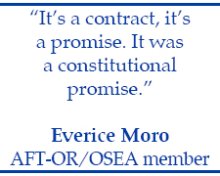
AFT-Oregon and OSEA retiree member Everice Moro testifies against the PERS cuts in 2013. Photo by Micheal Platt/OSEA
“I’m just one little old lady who said ‘hey, this isn’t right.’”
With that mindset, that’s how AFT-Oregon and OSEA retiree member Everice Moro’s name ended up on one of Oregon’s most controversial lawsuits, a lawsuit that went all the way to the Oregon Supreme Court and was decided April 30. The Oregon Supreme Court ruled that the state must pay all of the pensions promised through the Public Employees Retirement System, or PERS.
The decision deems SB 822 and SB 861 the two bills designed to cut previously agreed upon cost-of-living adjustments for retirees as unconstitutional.
“The state made a good-faith deal with these employees, who devoted so much of their working lives to serving their communities,” Moro’s attorney Greg Hartman said in a press release April 30. “Today the Supreme Court let them know that they can count on a secure retirement, and will be able to afford groceries, medical bills, car repairs, and other day-to-day living expenses which rise with inflation.”

Even after working for the school district for 30 years Moro only made $14.61 an hour, and never saw a wage increase of more than 2 percent. And all that time, Moro was promised her pension would be contractually safe. So Moro never complained about taking a pay cut, or dealing with a wage freeze. There was light at the end of the tunnel.
When the state of Oregon threatened to cut her pension to save money, Moro was furious.
“It’s wrong. It was wrong then. It’s just wrong,” Moro said. “It’s a contract, it’s a promise. It was a constitutional promise.”
Moro wasn’t the only one outraged, there were probably 100,000 other PERS recipients sharing a similar feeling.

As one of the 13 plaintiffs in the case, Moro was selected to go to the Supreme Court to provide her testimony and hear the legal arguments.
“Going to the Supreme Court to hear the oral arguments … that was incredible. It was very meaningful to me to represent over 100,000 retirees in the state of Oregon,” Moro said. “Complete strangers have contacted me to tell me how important it was that I stood up and did this.”
Moro is humble about her court victory. She claims she didn’t really do anything significant and she merely stood up for workers, education and what was right.
It’s this idea of right and wrong that drives Moro.
“You know what districts are doing now? They hire people for 3 hours and 55 minutes so they don’t have to give them benefits,” Moro said. “We have turned our schools and public agencies into Walmart.”

“I hate to see people being ticked off at me because I get my pension that I worked very hard for … when corporations continue to give their giant amounts of money in bonuses or stock options to their top employees, while we’ve given their companies tax breaks and goodies,” Moro said.
Regardless of the push back, Moro has many more allies than opponents.
“When Everice told me she was going to help us pursue this case I was so thrilled. She is typical of so many of our members who dedicate their entire career to students and schools, but only earn a modest income in return,” AFT-Oregon President David Rives said. “Retirement security is the one thing that people can count on for their hard work.”
Moro won’t be breaking the state’s bank and owning a vacation mansion in the Bahamas off of her PERS funds. Moro will earn about $18,000 a year from PERS after taxes. Some of the PERS recipients will receive only one dollar a year from their PERS retirement.
She plans on using these funds to help pay off her house and close up loose ends so she doesn’t burden her children after she’s passed. However, she’s still nervous about what the future holds and if she’ll be able to afford any medical bills or serious emergencies.
Until then, Moro will continue enjoying retirement working with others helping them fight for what is right.
